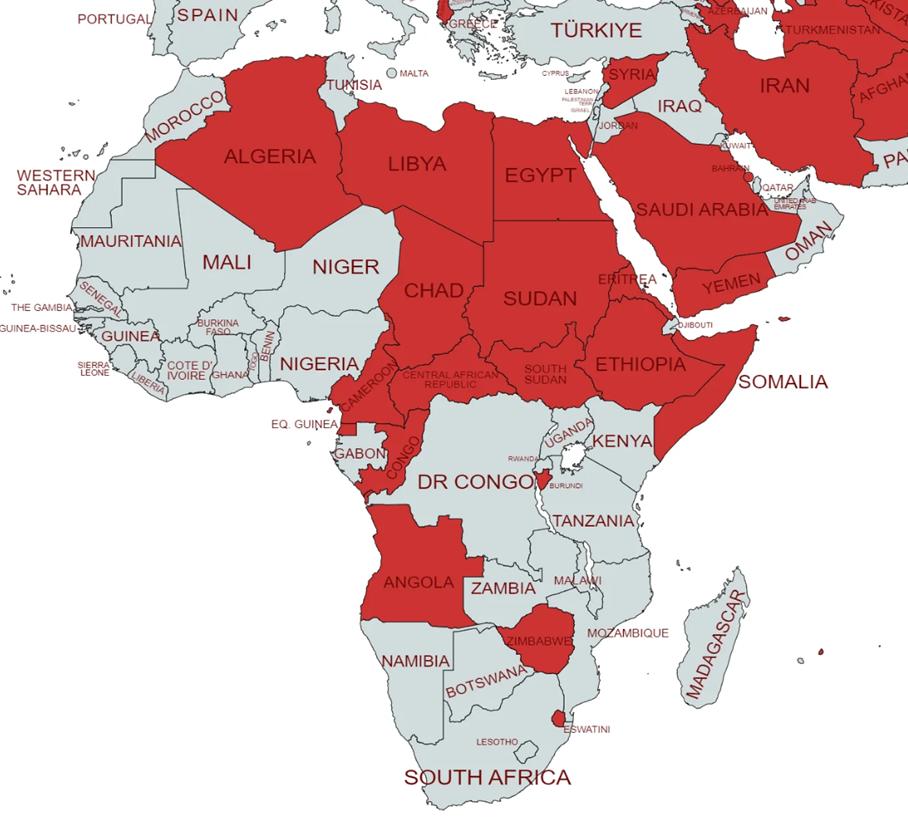
In today's era of rapid technological evolution, artificial intelligence is like a shining star, shining in every inch of the world, and the African continent is no exception. Although Africa faces many challenges in terms of technological infrastructure and professional talent pool, the rise of artificial intelligence has brought unprecedented new opportunities for it. Not long ago, the first African Artificial Intelligence (AI) Technology Development High-level Forum was held in Morocco, with the theme of "Artificial Intelligence technology: a lever for Africa's development".
The application of artificial intelligence in the field of agriculture has injected strong impetus into the process of food security and agricultural modernization in Africa. With smart sensors and data analysis, farmers can more accurately control soil moisture, fertility, and disease and pest trends, thus achieving rational irrigation, precise fertilization, and timely disease and pest control goals. In Ethiopia, for example, an AI-powered agricultural application can effectively predict the potential impact of weather changes on crops, helping farmers plan ahead and greatly reducing agricultural losses caused by natural disasters. In Uganda, for example, drones using artificial intelligence technology can quickly scan vast farmland, accurately identify areas affected by pests and diseases, and provide precise guidance for precise medicine application.
Education is a key element to change the future pattern of Africa, and the innovative practice of artificial intelligence in the field of education is gradually filling the gap in African education resources. Intelligent education software can tailor personalized learning plans according to students' learning progress and personal characteristics. In South Africa, many schools have introduced AI-assisted teaching systems that can automatically correct homework, analyze students' learning difficulties, and provide teachers with targeted teaching suggestions. In Tanzania, an educational technology company has developed an AI-based language learning app to help students improve their English, building Bridges for them to gain more knowledge and communicate with the world.
Healthcare has been one of Africa's biggest challenges, and the advent of artificial intelligence offers a glimmer of hope for improvements. Intelligent medical diagnosis systems can help doctors diagnose diseases more quickly and accurately. In Nigeria, a medical organization used artificial intelligence algorithms to analyze medical images, significantly improving the accuracy of early cancer screening. In Ghana, an AI-based medical app gives initial diagnostic recommendations based on a patient's symptoms, helping the patient get the right direction in time. At the same time, AI can also be applied to drug research and development and optimal allocation of medical resources to improve the efficiency and accessibility of medical services.
In the financial sector, AI is driving the adoption and innovation of financial services in Africa. Mobile payments and digital finance are growing rapidly in Africa, and AI-enabled risk assessment models can more accurately judge borrowers' credit profiles, reduce risks for financial institutions, and allow more people to access credit support, boosting entrepreneurial activity and economic development. For example, M-Pesa, a mobile payment platform in Kenya, uses AI technology to provide users with personalized financial services, such as savings plans and insurance product recommendations. In Morocco, a fintech company is using artificial intelligence for anti-fraud monitoring, providing a strong guarantee for the security of financial transactions.
However, to unlock the full potential of AI opportunities, Africa still needs to overcome a number of challenges. Weak technical infrastructure, lack of professional talent, and data privacy and security issues need to be addressed. However, African governments and businesses are aware of these challenges and are acting on them. Some countries have increased investment in science and technology education, and are committed to cultivating local artificial intelligence talents. At the same time, we will continue to strengthen cooperation and exchanges with international science and technology enterprises and introduce advanced technology and experience.
According to the latest assessment of the Global System for Mobile Communications Association, artificial intelligence could bring $2.9 trillion in economic growth to Africa by 2030. Artificial intelligence opens a promising door for Africa's development. With the concerted efforts of all parties, we are convinced that Africa can seize this historic opportunity, realize economic take-off, social progress and improvement of people's lives, shine its unique light in the tide of global scientific and technological development, and write its own brilliant chapter. In the future, Africa will surely glow with more vigorous vitality and vitality because of artificial intelligence, and contribute more surprises and possibilities to the world.

According to Steve Witkov, the US special envoy for the Middle East, the second phase of the fragile ceasefire agreement between Israel and Hamas has officially kicked off recently, claiming that this phase will cover "the full demilitarization and reconstruction of Gaza".
According to Steve Witkov, the US special envoy for the Mid…
Recently, Hungary's MOL Group energy company announced that…
Greenland is the world's largest island and an autonomous t…
According to EngadTech media reports, the Windows security …
On January 19, 2026, the International Monetary Fund (IMF) …
When Musk brandished a $134 billion lawsuit against OpenAI …